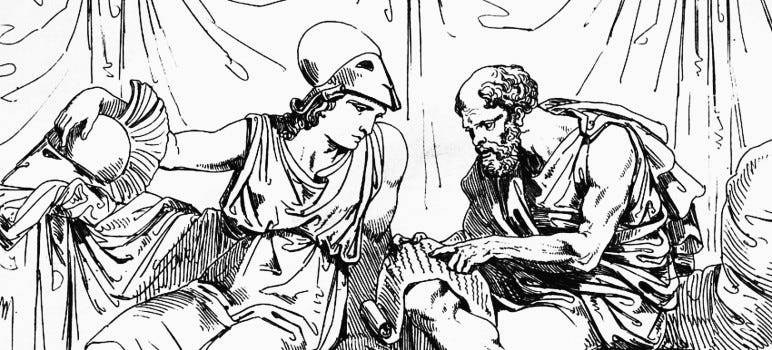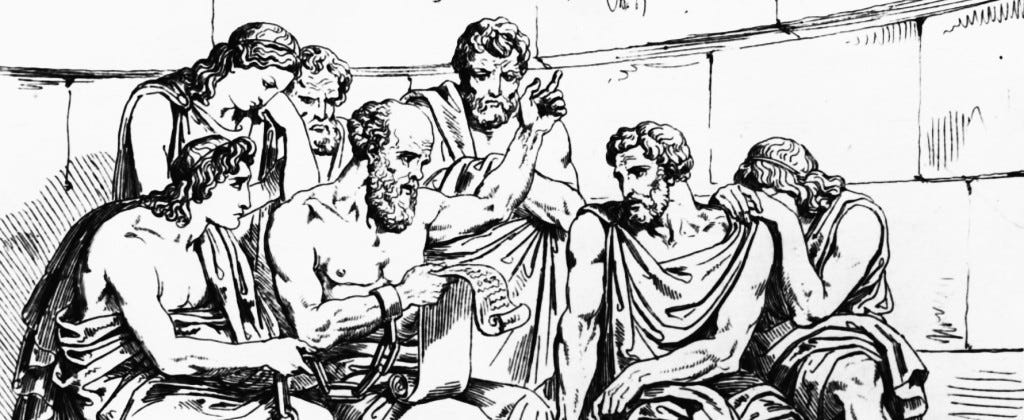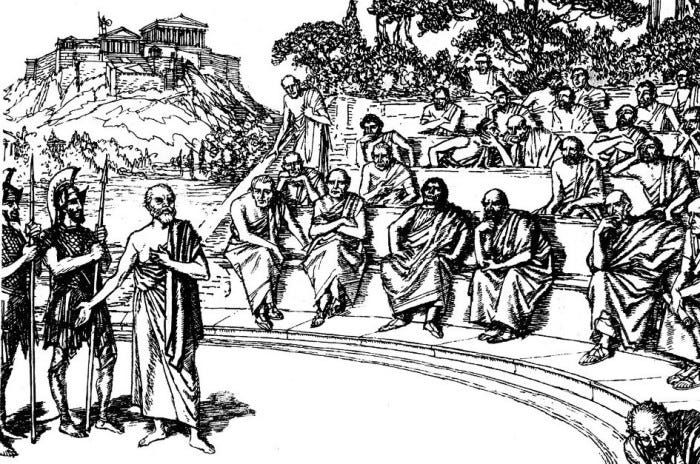Socrates' Doctrine
The Myth of Philosophy, Part 5 of 7
From what we have learned of Socrates thus far in this essay series, it might sound odd to speak of ‘Socrates’ doctrine.’ After all, he had claimed that any wisdom he possessed was knowing that he did not know very much, if anything. Further, he insisted he was not a teacher. He said that he did not inquire into matters of the gods or the afterlife. His ‘method,’ as such, seems to have mainly consisted of asking questions to the point of annoying most of his interlocutors, to the point that some of them hauled him into court.
So what sort of doctrine could we expect him to have? Maybe something completely negative, like ‘nothing is ultimately knowable?’ What he gives us is perhaps startingly positive and strong.
Socrates’ teaching: care of the soul
I will quote what I take to be the central message of the Apology at length:
“Well, supposing as I said, that you should offer to acquit me on these terms [that he stop practicing philosophy], I should reply, ‘Gentlemen, I am your very grateful and devoted servant, but I owe a greater obedience to God than to you; and so long as I draw breath and have my faculties, I shall never stop practicing philosophy and exhorting you and indicating the truth for everyone that I meet. I shall go on saying, in my usual way, ‘My very good friend, you are an Athenian and belong to a city which is the greatest and most famous in the world for its wisdom and strength. Are you not ashamed that you give your attention to acquiring as much money as possible, and similarly reputation and honour, and give no attention or thought to truth and understanding and the perfection of your soul?’ And if any of you disputes this and professes to care about these things, I shall not at once let him go or leave him; no, I shall question him and examine him and put him to the test; and if it appears that in spite of his profession he has made no real progress towards goodness, I shall reprove him for neglecting what is of supreme importance, and giving his attention to trivialities. I shall do this to everyone that I meet, young or old, foreigner or fellow-citizen, inasmuch as you are closer to me in kinship. This, I do assure you, is what my god commands; and it is my belief that no greater good has ever befallen you in this city than my service to my god; for I spend all my time going about trying to persuade you, young and old, to make your first and chief concern not for your bodies or for your possessions, but for the highest welfare of your souls, proclaiming as I go, ‘Wealth does not bring goodness, but goodness brings wealth and every other blessing, both to the individual and to the State’” (29c-30b).
Let’s go through this passage a section at a time.
First, Socrates rather enigmatically claims that his practice of philosophy is an obedience to God. Certainly he does not mean something like the Judeo-Christian God. Yet, though he talks of the gods, he is not quite conventional in his Greek paganism either. Remember that one of the charges against Socrates was that he had introduced new gods into the city. In the next essay we look at one of the hardest aspects of the portrait Plato gives us of Socrates and which he claims is the basis of that charge.
Now, Plato, in his later and more developed thought definitely pushes in the direction of a rationalized monotheism. Maybe we see Plato pushing the character of Socrates in that direction here, but I don’t think so. In this dialogue I think Plato is doing his best to present an authentic image of his mentor, though he is also setting that within a mythologized context to bring out the full meaning of Socrates as a person and philosophy as a practice. I think at most Socrates is intuiting something.
Sometimes when he talks about a god or the God, he has a particular Greek god in mind like Athena, patron of Athens, or Apollo whose oracle he had dealings with that we looked at previously. Also, Socrates will move back and forth between talking about gods in the plural and God as a singular as he seems to be doing here. I think that at a minimum, Socrates has discerned that there must be a unity within divinity; how that exactly shakes out, I don’t think Socrates had come to a definite conclusion about. He said he did not inquire into these matters. Given what follows in his speech and his emphasis on ‘the Good,’ combined with his assumption that the gods must be higher and better than men, he wants to attribute goodness to them. While there might be some diversity within divinity, Socrates resists attributing goodness and evil to the gods. They must be good and they must be good in ways that are essentially complementary. Further, the gods, on Socrates’ surmise, actually know stuff (if anyone does), so they would not go around disagreeing with one another or fighting amongst themselves (as the traditional Greek gods are portrayed as doing in the traditional sources).
I do, then, think Socrates is guilty of introducing a new God, or conception of divinity, into Athens.i In a narrow sense, he is guilty and has confessed as much here. What his conception of divinity seems to do is vouchsafe the goodness of the Good. Whatever it is exactly, and the gods presumably know, it is good and part of our task is to inquire about it. But it is not a ghost, a fluctuating non-entity, a relative thing. If the gods are there, it is there.
Socrates, in various dialogues, is often presented as fairly conventional-appearing in his piety. He makes religious observances, he says prayers, he admonishes people to not be impious. Yet the whole time his conception of the divine seems to be evolving in a particular direction such that the divine is aligned with the Good, the True and the Beautiful and their unity (though the explicit statement of that does not come until later in Plato’s own thinking).
We will look closer at what some of Socrates’ notions about the divine were in the next essay which will take that as its focus. For now, Socrates claims and seems to believe he is on a mission from his God.
Second, Socrates sets up a clear distinction between things of value; between the external (money, reputation, body, possessions) and the internal. He is not denying that all may be goods, but he is saying they are not equal goods. He is explicitly saying that the health of our soul (psyche) is primary. Sometimes this is translated as ‘mind,’ but that is overly cognitive. There is some notion of the individual soul in Socrates and, as we will see later, the question of what happens to it at death is a real question for Socrates. Yet, it is probably not as individualized as the Christian conception. For Socrates it makes sense to speak of one’s soul, but that soul is also probably still held to be part of a larger integrated spiritual world. Either way, Socrates is saying it is what is really important about and to us. Why?
Socrates claims that internal and external goods ultimately derive from the health of the soul, but the health of the soul does not derive from external goods. I think this is a pretty strong argument which it is not hard to see the truth of. This is not explicitly stated, but Socrates definitely associates the health of the soul with the possession of the virtues, especially justice, courage, moderation, and wisdom. The question of what those are exactly is something Socrates has not told us and in fact, his wisdom probably consists in not claiming to know exactly what constitutes them.
By definition, if a person possessed these virtues, they would have a good, healthy soul and that is a good thing. Further, let’s look at the argument that this is the basis of external goods as well by looking at the contrary case. If a person lacked these virtues, if they were unjust, cowardly, given to fluctuating extremes, and foolish would they tend to improve their reputations, acquire more money and possessions, and take reasonable care of their bodies? Clearly not.
Now, the world is complicated enough, and possibly amoral enough, that people can gain these things by hook and by crook. But all in all, a person possessing those strengths of character would probably tend to improve their reputation, manage their money and possessions pretty well, and give sufficient attention to their physical health. On the other hand, other people thinking you’re good, amassing a lot of money, and having well defined musculature does not make you virtuous.
I think we can grant a general validity to Socrates’ argument thus far, but admit that there are many counter examples: sometimes the schmucks seem to make out ok and sometimes the good people seem to get screwed over. Socrates himself, whom Plato is presenting to us as an image of the good man, is about to get condemned and eventually executed. How can it be that if the world is as morally coherent as Socrates wants to suggest it is (the gods vouchsafe it, the usual course of events confirms it), how can it be that the good man is about the suffer such harm?
Socrates insists that he isn’t about to suffer any harm at all.
No harm can come to a good man
This assertion will probably strike us as odd at first. Socrates says:
“I assure that if I am what I claim to be, and you put me to death, you will harm yourselves more than me. Neither Meletus nor Anytus can do me any harm at all; they would not have the power, because I do not believe that the law of God permits a better man to be harmed by a worse. No doubt my accuser might put me to death or have me banished or deprived of civic rights; but even if he thinks, as he probably does (and other too; I dare say) that these are great calamities, I do not think so; I believe that it is far worse to do what he is doing now, trying to put a man to death unjustly. For this reason, gentlemen, far from pleading on my own behalf, as might be supposed, I am really pleading on yours, to save you from misusing the gift of God by condemning me. I you put me to death, you will not easily find another to take my place. To put it bluntly (even if it sounds rather comical) God has assigned me to this city, as if to a large thoroughbred horse which because of its great size is inclined to be lazy and needs the stimulation of some stinging fly. It seems to me that God has attached me to this city to perform the office of such a fly; all day long I never cease to settle here there, and everywhere, rousing, persuading, reproving every one of you” (30c-e).
According to our usual scale of values (probably similar to that of the Athenians of Socrates’ day for which he had chastised them), to kill me, to take my possessions, or infringe on my liberty is to harm me.
Socrates wants us to be quite logical at this point. On the one hand, to harm these external things is not to harm me. ‘Me’ Socrates wants us to accept is our souls. Further, what would actually constitute harm in the case of ‘me?’ Relying on his previous argument to suggest that our primary duty, our main business, is to look after the wellbeing of our soul (which is ‘me’), genuine harm would be that which harms the soul. What would harm the soul? Our primary task is to become virtuous; to be good people. Hence, genuine harm would be that which makes us less good people; which corrupts us. Neither killing him, banishing him, taking his property, nor trammeling his liberty will make Socrates a less good person. Hence, they will not harm him.
His accusers may well be harming themselves in prosecuting him. If they are seeking to unjustly convict an innocent man, they are corrupting their souls by embracing injustice; they will go home from the trial less good men than when they entered.
An open doctrine, but with a safehold
If Socrates admits that he has a hard time telling exactly what justice, wisdom, courage, and moderation are, how does he know when he (or his accusers and jurors for that matter) are increasing the health of their souls and when they are corrupting them?
This is more implicit than explicit in the dialogue, but I think we can tease out the response fairly easily. In a previous essay we had seen how Socrates had claimed that his wisdom was a very human sort of wisdom, a wisdom that knew what it did not know. In response to his ignorance, he goes about questioning and testing himself and others. I think we can draw a sort of answer to the question by looking at how Socrates lived his life; what the practice of philosophy looks like.
It could be that the good life for a human being (an open, developing sort of being), is to seek the good life. That is, our good is a process, not a final state. Would this seeking tend to increase the virtues in us, even if we don’t yet know the exact definition of those virtues?
I would suggest that Socrates’ questioning and arguing is meant to show that he does have these virtues (sometimes we can tell what something is better by looking at it than at trying to conceptualize it). He has demonstrated the sort of wisdom he claims to have; he knows what he doesn’t know and can show others that they don’t know what they think they know. He knows himself. Has he been just? In numerous ways. In the way he has conducted his defense, in looking only to the truth, not in engaging in emotional defense or attack. Has he exhibited temperance? For the Greek philosophers this usually came down not to a sort of puritanical moralism (don’t drink, don’t smoke), but to giving things their proper weights. Socrates has demonstrated this in prioritizing matters of the soul over external matters. Courage? Almost every line of the dialogue shows Socrates acting bravely, not backing down, and not fearing the wrong things. Courage is knowing what to fear. Socrates would say not fearing those who can only affect the externals but fearing becoming corrupted which mostly we can only do to ourselves. He is the new hero and that hero is revealed to be a moral hero.
Finally, in showing us that bad people can do very little real harm to us he has built the castle from within which he can wage his battles. The soul itself, because its wellbeing or disease are largely up to us, is a bastion of interior freedom. Socrates has defended the ramparts of this fortress and he has shown us how we can do the same.
All quotes are from: Plato, The Last Days of Socrates: Euthyphro, Apology, Crito, Phaedo, translated by Hugh Tredennick and Harold Tarrant, Penguin, 2003.
i I am tempted to speculate that his conception of divinity bore fruit in Athens. When the Apostle Paul visited the city in the first century, he observed that the Athenians had a statue to ‘the unknown god.’ Paul commends them and says it is of this god he wishes to instruct them. Poor biblical commentators overlook Paul’s commendation and present this as paganism gone bad – we’d better put up a statue to the ‘unknown god’ just in case we missed one. Clearly the Athenians had meant the God above the gods or the divinity which encompasses all the gods, just as good Christian theologians will talk of ‘the God above God’ to denote the deep mystery of the godhead of which we cannot have knowledge.
This essay was first published on Winter Oak.







> I think that at a minimum, Socrates has discerned that there must be a unity within divinity; how that exactly shakes out, I don’t think Socrates had come to a definite conclusion about.
To me, this is one of the key things that makes monotheism different from polytheism. The polytheist, in projecting aspects of human experience and the world onto "gods," also projects the turmoil that humans experience and observe. The gods sometimes argue and vie for control. The monotheist, especially the monotheist who has reversed the direction from "create gods in humans' image" to "humans are created in God's image," acknowledges the harmony of the Holy Transcendent.
Very good!
“Courage is knowing what to fear. “ = a great line, a truth.